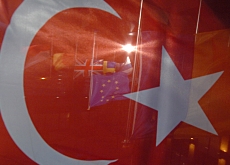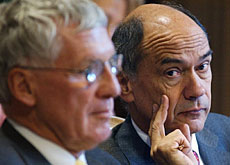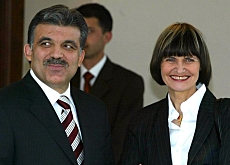Swiss could benefit from Turkey talks with EU

The launch of European Union membership talks with Turkey could help improve ties between Switzerland and Ankara, according to specialists.
Following the official decision to proceed with talks, reactions have generally been positive, including those of the sometimes critical Swiss media.
Commercial and economic ties could be stimulated, while political and cultural exchanges are expected to intensify.
“What holds true for Europe is also valid for Switzerland,” said the Swiss ambassador to Turkey, Walter Gyger.
He added that if Turkey made efforts to get closer to Europe, Switzerland would have to build on its own relationship with Ankara. “The negotiation process with the EU should help relieve some tensions,” he noted.
Switzerland and Turkey have had rocky diplomatic relations for the past few years, especially over issues related to the deaths of thousands of Armenians under Turkish rule in 1915.
The Swiss foreign ministry had little to say when asked to comment on the start of EU negotiations with Turkey.
“As we are not a member of the EU, Switzerland has no reason to comment on this decision,” said ministry spokesman Lars Knuchel.
Bilateral relations between Bern and Ankara are not affected by the EU talks or the prospect of Turkish membership. “Our [bilateral] accords [with the EU] remain unchanged for now,” said Knuchel.
Business benefits
Turkey’s possible EU membership will only become officially an issue in 2014, the earliest point at which it can join the Union. Some bilateral accords between Switzerland and the EU, especially those on security and asylum, as well as the free movement of labour will come under scrutiny.
Knuchel said that the labour agreement had clauses guaranteeing long transition periods as well as the possibility of putting its extension to a nationwide vote.
“The biggest challenge for Switzerland and Turkey during the negotiation process will be to ensure that both countries give enough attention to their bilateral relationship,” he said. “Ankara will be focusing on Brussels in the coming years.”
But Knuchel added that the opening of talks could positively influence commercial and economic relations with Turkey.
The Swiss Business Federation, economiesuisse, said on Tuesday that it expected some favourable fallout during the negotiations for the Swiss export industry.
“Turkey joining the EU would be in our interest,” said federation spokesman Pascal Gentinetta.
Critical media
The Swiss press generally welcomed the announcement of adhesion talks on Tuesday, although there was some criticism of the run-up to the start of negotiations.
“After decades of waiting, these negotiations are the right decision,” wrote Zurich’s Neue Zürcher Zeitung.
The Tages-Anzeiger criticised Union member states for dragging their feet before agreeing to open talks. “It was grotesque and painful theatre with the EU in the main role,” it said.
It pointed the finger at Austria, adding that Vienna had “held up proceedings until it got the all-clear for adhesion talks with Croatia”.
Geneva’s Le Temps also criticised the Austrian tactics, saying that the government’s fear of rampant anti-Turkish sentiment at home “had almost been enough to make Chancellor [Wolfgang] Schüssel think twice before agreeing”.
The Aargauer Zeitung pointed out that the “hesitations surrounding the decision to open talks with Turkey were proof of how unsure the EU is of itself at the moment”.
The Swiss press tended to agree that negotiations with Turkey would be a long and complicated affair, especially since – as Le Temps put it – “Europe lacks any leaders with a vision”.
“In Berlin, they’re still looking for a chancellor. And in Paris, there are dozens of wannabe presidents.”
swissinfo with agencies
European Union membership talks with Turkey could last anything up to 15 years.
The beginning of negotiations with Turkey is the high point of a process that began over 40 years ago.
A first association came into being with the signing of the Ankara Agreement in September 1963, which called for the progressive establishment of a customs union bringing the two sides closer together in economic and trade matters.

In compliance with the JTI standards
More: SWI swissinfo.ch certified by the Journalism Trust Initiative




You can find an overview of ongoing debates with our journalists here . Please join us!
If you want to start a conversation about a topic raised in this article or want to report factual errors, email us at english@swissinfo.ch.